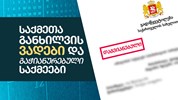During 15 years, 12 facts of violation of communication with the judge have been recorded
Table of contents

The independence of an individual judge and the existence of political or other influences towards him are issues that do not lose their relevance in our reality. In high-profile cases involving the influence of political authorities or other individuals/groups, there are often accusations that the judge was not independent, that he was pressured, and that his decision was not fair.
It is natural that without communication with the judge reviewing the case, it's impossible to implement intervention in judicial activities and influence the decision-making process. And the judge is obliged, in case of communication with him in a prohibited form, to inform the relevant authorized person (in most cases, the chairman of the court).
The Georgian Court Watch was interested in the statistics regarding cases of violations of the rules of communication with judges. The information obtained by the organization reveals that the statistics on cases of violation of communication with the judge are very meager.
According to the information provided by the Supreme Council of Justice, during approximately 15 years - from 2007 to 2022 - 12 facts of violation of communication with judges of general courts of Georgia have been identified.
The rule of communication with the judge was violated by the following persons:
- civil servant - 4;
- interested person - 4;
- process participant - 3;
- Lawyer - 1.
In the case of all of them, the type of measure used was a fine.
"Communication with the judge" – definition
The Organic Law "On Common Courts" prohibits communication with a judge related to the consideration of a specific case or issue and/or the likely outcome of the case and violates the principles of court/judge independence, impartiality and adversarial justice. Communication with the judge is not allowed from the moment the case enters the court before the decision in this case enters into legal force, and in the criminal case also during the investigation. The term "communication with a judge" refers to any communication with a judge of a General Court, including correspondence, telephone or other technical means.
People who are forbidden to communicate with the judge
Communication with the judge in connection with the case under consideration is prohibited:
1. to the participant of the process;
2. to any interested person;
3. to a public servant;
4. to a state employee;
5. to a state-political official;
6. to a political official
Prohibited communication with the judge by the entities listed above is the basis for disciplinary responsibility and fines.
Amount of fine for violation of the rule of communication with the judge
1. In the case of a participant in the process, an interested person, a public servant - not more than 5,000 GEL;
2. In the case of a state employee, a state-political official, a political official - no more than 10,000 GEL.
If the communication bears the signs of a crime, the norms of the Criminal Code apply to it and criminal liability follows. E.g. gross interference in court activities (Article 364 of the Criminal Code); Threats to take life, harm health, or destroy or damage property against a judge or his close relative (Article 365 of the Civil Code) is a crime and is punishable by criminal law.
Legal response to violation of the rule of communication with the judge
To whom a written notification of prohibited communication is sent:
- In the case of communication prohibited by law, the addressee of the communication (the judge with whom the communication was made) is obliged to immediately notify the chairman or the judge authorized by him in writing.
- If the judge is the chairman of the court at the same time, he immediately informs the chairman of the higher instance court or the judge authorized by him about the prohibited form of communication with him.
- As for the judge of the Supreme Court, he must immediately notify the first deputy chairman of the Supreme Court or the deputy authorized by the chairman about communication in a prohibited form.
- The Chairman of the Supreme Court should immediately apply to the Supreme Council of Justice.
The judge who has the authority to review the written notice of the judge shall review the notice within 14 days of receipt. The law grants the right to participate in the review of the written notice to the person who, according to the notice, communicated with the judge in a prohibited manner, to his lawyer (legal representative), as well as to the author of the notice. In addition, the trial judge may subpoena and question a person whose testimony may be material to the resolution of the matter, as well as suggest the parties to submit evidence necessary to verify the information stated in the notice.
It is important to note that the law does not oblige the judge who is hearing the written notice to consider the matter orally. According to the Organic Law, the judge will conduct an oral hearing with the participation of the parties, if he deems it necessary, and the non-appearance of the parties does not prevent the consideration of the matter. If the parties participate in the oral discussion, they have the right to give clarifications regarding the issue and to formulate their opinions. If the judge with the right to consider the written notification does not review the notification within the specified period, the author of the written notification has the right to appeal to the Supreme Council of Justice. The Council will consider the written notification within one month of its reception.
Liability for Prohibited Communication
After considering the matter, if the authorized judge determines that they have communicated with the judge in a prohibited manner, he has the right to:
- make a decision on fining him;
- to ask the secretary of the Supreme Council of Justice of Georgia the question of imposing disciplinary responsibility on him, if the person is a public servant.
The concept of civil servant is defined by Article 3 (d) of the Law of Georgia "On Public Service", according to which, a civil servant is a professional civil servant, civil servant or civil servant employed in the public service under an administrative contract or labor contract.
The Secretary of the Supreme Council of Justice of Georgia will review the written notice within one month of receiving it and is authorized to: in the case of communication by the prosecutor with the judge in a prohibited manner, he should submit to the general prosecutor in order to respond; In the case of a lawyer - to the chairman of the association of lawyers.
As for the investigator's communication with the judge in a prohibited manner, the organic law does not specifically explain who is the authorized person in such a case who should respond to the action of the investigator and to whom the Secretary of the Supreme Council of Justice should address.
If the secretary of the Supreme Council of Justice, as a result of reviewing the materials, comes to the conclusion that the action contains signs of a criminal offense, he is authorized to send the case materials to the relevant investigative bodies according to the sub-location.
The organic law gives the right to the fined person or his lawyer (legal representative) to appeal the decision on the fine once to the chairman of the superior court or to a judge authorized by him, and the decree of the Deputy Chairman of the Supreme Court - with the Chairman of the Supreme Court.
Protecting the judge from any form of influence is essential for ensuring the independence of the judge and fair justice. That is why it is important for judges to react to the facts of prohibited communication, which at the same time would create a solid foundation for the prevention of similar facts in the future.
---
The materials distributed by courtwatch.ge and published on the website are the property of "Georgian Court Watch", when using them, "Georgian Court Watch" should be indicated as the source.

How to (not) Evaluate Judge's Integrity

Judges who have been stripped of their judicial powers

Interview with a Former Judge Ana Ghelekva - A Choice Requiring a Career Sacrifice

JUDGE - SERVANT OF FREEDOM OR POWER?

WHAT GEORGIAN JUDGES ARE (NOT) PUNISHED FOR - THE PRACTICE OF THE DISCIPLINARY CHAMBER FROM 2012 TO THE PRESENT

Protracted cases - a problem that the court recognizes































